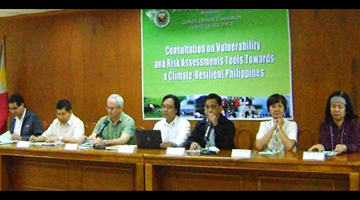 Two government agencies team up in a bid to come up with measures and appropriate strategies in addressing climate change.
Two government agencies team up in a bid to come up with measures and appropriate strategies in addressing climate change.
The Climate Change Commission (CCC), in partnership with PCARRD kicked off with the first in a series of consultations for this purpose at the Mabini Social Hall in Malacañang, Manila.
Titled as “Series of consultations on vulnerability and risks assessment tools towards a climate change resilient Philippines,” the activity sought to look into climate change measures and strategies and evaluate their appropriateness in filling up the gaps in climate change research and practice in the Philippines.
The activity also served as a venue for exchanging important information about these strategies and measures.
CCC Commissioner Naderey Saño said that at present we are dealing with the effects of a 4°C warmer world and that we are in the eye of the perfect storm. He also said that addressing the impacts of climate change involves the greatest economic and societal transformation.
Saño, however, emphasized a quantum leap in our nation’s effort to address the challenges of climate change. This is with the passing of the Climate Change Act of 2009 and the National Climate Change Action Plan for 2011-2028.
Dr. Danilo C. Cardenas, PCARRD Deputy Executive Director for Research and Development, presented the rationale of the consultation series and expressed appreciation of the partnership between PCARRD and CCC.
Cardenas also highlighted PCARRD’s climate change initiatives, most notable of which was the crafting of the Philippine Science and Technology Agenda on Climate Change (PSTACC) for the agriculture, forestry and natural resources sectors in 2009 and its translation to research and development (R&D) programs.
Cardenas emphasized that a major concern in R&D is the use of a climate scenario model that is appropriate and acceptable for our local use, an impetus for PCARRD to take in the forum.
Representatives from various government agencies, research institutions, local government units, and state universities and colleges participated in the said event.
Ms. Lourdes Tibig of the Manila Observatory and Rice Watch and Action Network talked about the concepts and importance of vulnerability and risk assessments as well as the framework and approaches towards climate change concerns.
Dr. Peter Urich, managing director of the CLIMsystems Ltd. in New Zealand and professor at the University of Sunshine Coast in Australia, introduced SimCLIM, a software that simulates the impacts of climate change and variability using both spatial and time-series data and models. Urich explained how its integrated assessment model can bridge the gap between the global-regional scale and local-national scale of climate science.
Dr. Rex Victor Cruz, dean of the University of the Philippines Los Baños-College of Forestry and Natural Resources (UPLB-CFNR) and a UP Scientist Awardee, illustrated the role of SimCLIM in the preparation of Comprehensive Land Use Plans in selected municipalities in Albay. Through SimCLIM, the province was able to validate and correct existing hazard maps and develop appropriate disaster risk reduction and climate change adaptation strategies.
Dr. John Pulhin, also from UPLB-CFNR and a scientist on the Intergovernmental Panel on Climate Change, demonstrated vulnerability and adaptation assessment of climate change and sea-level rise using select upland and coastal communities in Albay and presented the potentials of combining SimCLIM and participatory techniques in conducting said assessments.
Dr. Ma. Leonila Bautista, associate scientist of Philippine Institute of Volcanology and Seismology–Department of Science and Technology (PHIVOLCS-DOST), presented the Rapid Earthquake Damage Assessment System. Meanwhile, Engr. Rene Mendoza of the Advanced Science and Technology Institute (ASTI)-DOST, provided the participants with an overview of ASTI products and services, which makes use of information and communications technology or ICT for disaster risk reduction.
In support of the first consultation activity, Saño encouraged, among others, the establishment of an exchange platform and linkages with data keepers, creation of an inter-agency group for vulnerability and risks assessment tools compendium development, adoption of a mentoring network, and the designation of the national technical panel of experts.
